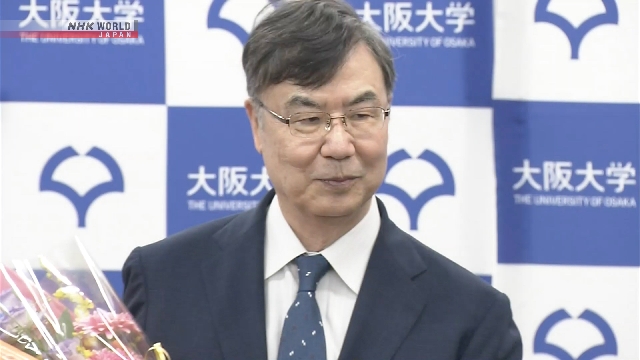Japanese scientist Sakaguchi Shimon is one of three winners of this year’s Nobel Prize in Physiology or Medicine.
Last year the Nobel Peace Prize was awarded to Nihon Hidankyo, a Japanese organization representing the survivors of the atomic bombings of Hiroshima and Nagasaki during World War Two.
Sakaguchi is the 6th Japanese person to receive the physiology or medicine prize, and the first since Honjo Tasuku, who was awarded it in 2018. And he is the 29th Japanese individual to win the prize, following physicist Manabe Syukuro, who was honored in 2021. The 29 recipients include those who obtained US citizenship.
Sakaguchi, 74, is from Nagahama City, Shiga Prefecture.
He graduated from Kyoto University’s Faculty of Medicine in 1976. He then studied immunology at Johns Hopkins University in the United States.
He returned to Kyoto University to become a professor and then served as director of the university’s Institute for Frontier Life and Medical Sciences. Currently, he is specially appointed professor at the University of Osaka Immunology Frontier Research Center.
He discovered regulatory T cells in 1995, which are necessary for suppression of overreaction to self-produced antigens and suppression of allergic responses.
He demonstrated that when the number of regulatory T cells is reduced, or the function of those cells is suppressed, immune responses against cancer cells can be strengthened. And when regulatory T cells are increased or made active, rejection in organ transplantation can be suppressed.
There is hope that his achievements will be applied to the treatment and prevention of human immune disorders.
Sakaguchi won a Canada Gairdner International Award in 2015, the Crafoord Prize from the Royal Swedish Academy of Sciences in 2017, and the Robert Koch Award, one of Germany’s prestigious scientific awards, in 2020.
He was also awarded Japan’s Order of Culture in 2019.
Editorial Note: An earlier version of this story said that Sakaguchi worked at Institute for Life and Medical Science at Kyoto University. The correct name of the facility is Institute for Frontier Life and Medical Sciences.


AloJapan.com